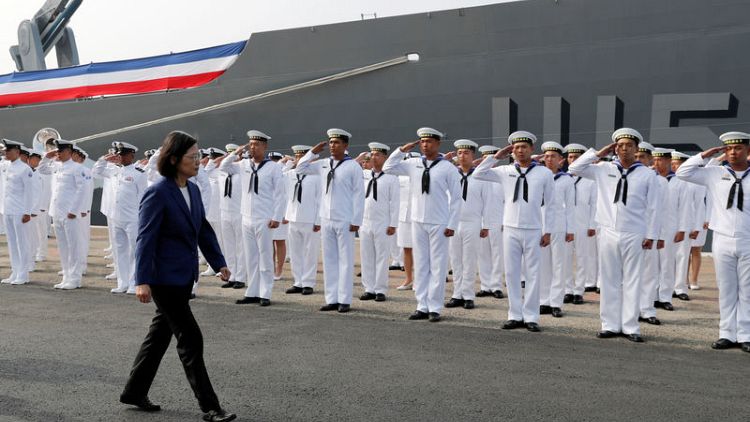TAIPEI (Reuters) - Taiwan's government faces a test of confidence at local elections this weekend as President Tsai Ing-wen grapples with rising pressure from China and criticism that her reform agenda has slowed.
Saturday's mayoral and magisterial elections could also be a bellwether for the 2020 presidential election, say observers.
China has become increasingly concerned that Tsai wants to push for formal independence and has ramped up pressure to assert its sovereignty over the democratic island.
Beijing regards self-ruled Taiwan as part of China and has vowed to use force if necessary to keep the island.
In a post on Facebook, Tsai has urged people to "vote for Taiwan's democracy" and rallied support for her party in a bid to "boost the energy of reform and progress".
More than 11,000 seats are up for grabs in municipalities, counties, townships and villages, with the southern city of Kaohsiung a key battleground for the ruling Democratic Progressive Party (DPP), which has held the city for two decades.
Tsai's government has repeatedly said China is attempting to affect election results with its "political bullying" and "fake news", an accusation Beijing calls "fabrication".
Tensions across the Taiwan Strait have heightened with China conducting military drills around the island and snatching Taiwan's dwindling number of diplomatic allies.
Tsai's reform initiatives, from the island's pension scheme to labor law, have also come under intense voter scrutiny recently, say observers.
Confidence in the government has waned in recent months after reform moves upset both the opposition and some supporters, who said Tsai had backed away from promises to reduce the deficit and pollution.
Some reforms have "stoked a lot of controversy" and the DPP is facing challenges from the China-friendly opposition Kuomintang, said Edwin Yang, associate professor at National Taiwan Normal University.
Underscoring Tsai's challenge will be a series of public votes on Saturday on whether to make same-sex marriage legal, an issue which has deeply divided Taiwan.
Tsai has made little progress despite campaigning on a promise of marriage equality in the run-up to elections in 2016.
In Asia's first such ruling, Taiwan's constitutional court declared in May last year that same-sex couples had the right to legally marry, and set a two-year deadline for legalisation.
Voters will also be asked whether the island should join the 2020 Tokyo Olympics as Taiwan, rather than "Chinese Taipei" – the name agreed under a compromise signed in 1981. A vote to compete under a Taiwan banner would further rile Beijing.
Tsai has repeatedly emphasised maintaining the status quo with China, but Beijing has become angry at recent U.S. overtures towards Taiwan, which include encouraging senior U.S. officials to visit the island. Washington has no formal ties with Taiwan but is its main source of arms.
(Reporting By Yimou Lee and Jess Macy Yu; Editing by Michael Perry)
